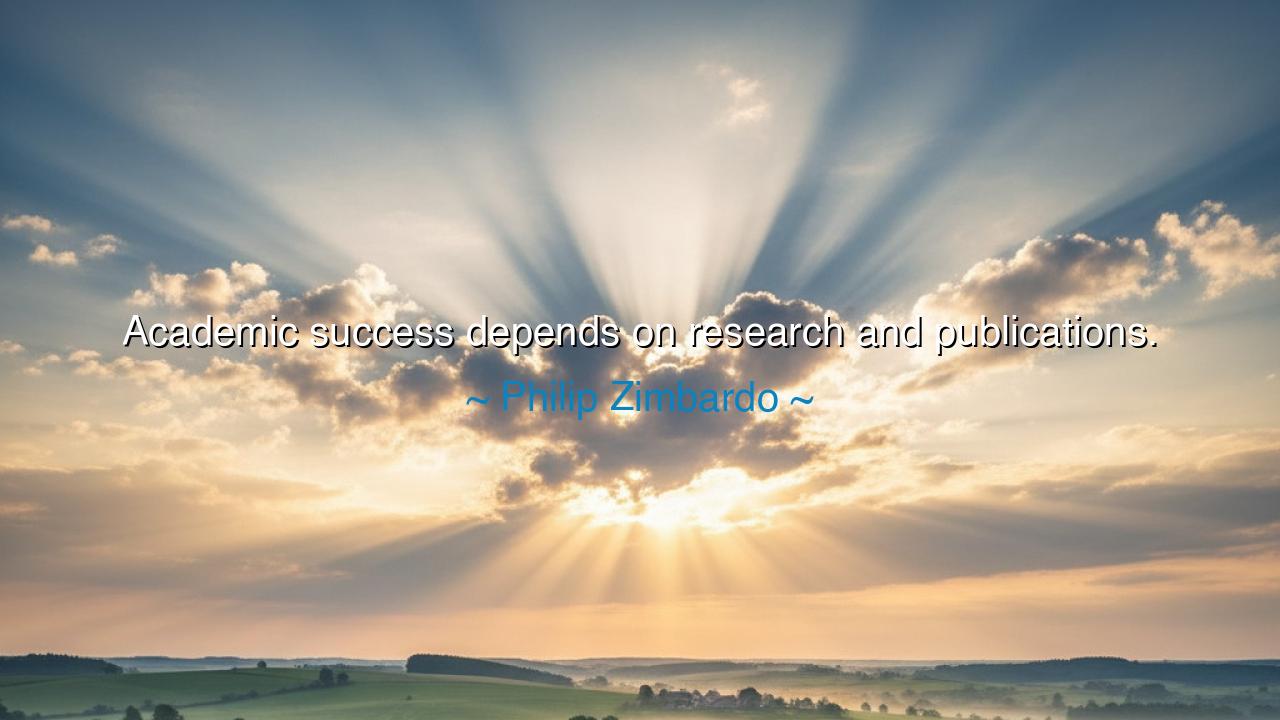
Academic success depends on research and publications.






When the psychologist Philip Zimbardo declared, “Academic success depends on research and publications,” he spoke not merely of universities and scholars, but of the very lifeblood of knowledge itself. For the academy is not built on titles alone, nor on lectures delivered to passing generations of students, but on the creation and sharing of truth. To research is to dig deep into the unknown; to publish is to cast light so that others may see. Without these two pillars, the halls of learning collapse into silence and stagnation.
The ancients understood this truth in their own way. The philosophers of Athens gathered not simply to speak, but to question, to probe, to leave behind written dialogues that outlived them. Had Plato and Aristotle not recorded their inquiries, their wisdom would have been lost to the winds of time. It was through their willingness to set thought into form that generations yet unborn could inherit their brilliance. This is the essence of Zimbardo’s words: research uncovers the treasure, but publication shares it with the world.
History shows us countless examples. Consider Marie Curie, who devoted her life to the study of radiation. Her research was grueling, her experiments exhausting, yet without her relentless pursuit of knowledge, the mysteries of radioactivity would have remained hidden. But more than research alone, it was her publications that shook the world of science, allowing others to build upon her work. Through the ink of her pen, the field of physics advanced, and her name was carved among the immortals.
Or look to Charles Darwin, who traveled the seas, observed the creatures of the earth, and pieced together the theory of evolution. His journals overflowed with insight, but it was his book, On the Origin of Species, that transformed the minds of humanity. If he had kept his knowledge private, his discoveries might have withered with him. But through publication, his research became a cornerstone of biology, sparking both controversy and enlightenment that still endures today.
The meaning is clear: in the realm of scholarship, thought must not remain hidden. The scholar who researches but does not publish is like a farmer who plants but never harvests, who lets the grain rot in the field. True academic success requires both the courage to explore and the generosity to share. To stand among the great is not only to know, but to contribute, to give one’s work to the endless river of human learning.
The lesson for us is both noble and practical. If you are a seeker of knowledge, cultivate the discipline of research. Be patient in your search, diligent in your methods, unafraid of error, for all discovery is born of persistence. But also cultivate the art of communication: write, speak, publish, and share. For your research, no matter how profound, is barren if it never reaches another soul. In this balance lies the scholar’s true destiny.
Practical wisdom follows. Set aside time for both study and expression. Do not hide your insights in dusty notebooks, but refine them until they can stand before the world. Submit them to journals, share them with peers, teach them to students. Accept criticism not as a wound but as a sharpening stone. For research and publication are not separate acts, but twin flames that together light the path of knowledge.
Therefore, let us hold fast to Zimbardo’s words. “Academic success depends on research and publications.” For in research we honor curiosity, and in publication we honor community. Together they form the covenant of scholarship: to seek truth, and then to pass it forward. In this way, knowledge endures beyond one lifetime, and each generation becomes wiser than the last.






AAdministratorAdministrator
Welcome, honored guests. Please leave a comment, we will respond soon